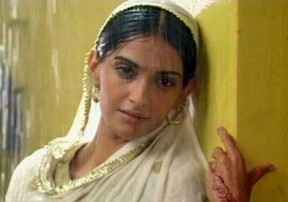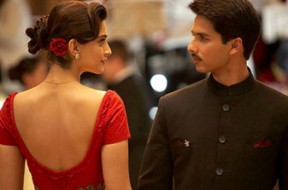Damp, narrow lanes with houses huddled together. Peeling walls, fading patinas. Melding terraces. Halwai shops. A musty little bakery with unlabelled bread. Young girls and boys in clumsy cardigans. A young boy’s shelves packed with medals and trophies and books, some of them in Punjabi.
Boxes of pinnis. Mustard and sugarcane fields and school girls in white salwar suits. Gurudwara banter. The mohalla quarrels led by a sour, expletive spewing chachi. The quilts and mattresses borrowed by a shaadi wala ghar. The sights, sounds, textures, yes, almost smells of Punjab.
All of the above come alive in the first-half of Pankaj Kapoor’s directorial debut Mausam. Only someone who has grown up in Punjab like he has, can understand that Punjab is not the cosmetic bhangra, parandi and dupatta cliche celebrated in most Hindi films. It is small talk, colloquialisms, bonhomie, a million little details packed in small shops, a way of life and living and Kapoor along with cinematographer Binod Pradhan affectionately pays a tribute to the Punjab of nuanced memory, of the wrench you feel when a train puffs out of a station, leaving all that is familiar behind.
There is much to like. The way Shahid Kapoor’s Harry tries to catch the eye of a diffident Kashmiri Aayat. The way, in a small, intimate world of familiar faces and restricted movement, they find little pockets of intimacy and scribble one-liners on pieces of paper while a tired bride-to-be snoozes between them. Or when Harry wakes up one morning to find her gone and stands desolately in a station. And as a writer I respect said, “In a world where Mere Brother Ki Dulhan was a hit and Bodyguard, a superhit, Mausam seems almost Oscar worthy.” But it will be not be reviewed as leniently or as affectionately as it takes itself far too seriously. Because it has what they call, epic pretensions. There is more in one frame of Mausam then there was in the entire duration of Bodyguard but guess what, we can forgive a bad film from being bad but not a film that could have been better.
Mausam is not a perfect film. There are many things you wish were there or were not. For instance, the shift between a dusty village in Punjab to Scotland is abrupt to the point of being painful. It is almost as if two people we had come to like and become friends with, suddenly turn into distant, aloof strangers. I would have liked to see the exact moment when Harry and Aayat lock eyes after seven years of silence. Also there are too many touristy snapshots and too little passion in this segment. Sure, the Hum Dono lighter, the Abhi Na Jao Chod Kar refrain, the midnight ride in a carriage have resonance but we should have seen more of the undefinable magic that glued these two lovers together even in absentia.
I also had an issue with just how little volition Aayat has. She is tossed from one city to another, one circumstance from another and has little say in what she wants her life to be. Could she have been a woman with a point-of-view? Someone like Rani Mukerjee in Hum Tum who after a personal tragedy builds a new life in a new country? From a heartfelt beginning, the story turns suddenly cosmetic. Maybe, if the narrative had remained rooted in India, it would have connected far more with the audience.
Still there are warm moments that reach out and make you feel things you have not felt for Hindi film protagonists in a while. Like the conversations between Harry and his sister, his interactions with her kids, Supriya Pathak’s almost vacant eyes as she recounts the bomb blast in 1992, the subtext of a country falling apart at the seams after the Babri Masjid demolition. The desperate love a childhood friend feels for Harry and who even after having a baby with another man, tells him helplessly, angrily that she would even now jump off a train with him if he wanted her to.
The dialogues however let the film down a bit as they fail to match the scale, the grandeur the film aspires to. Also after a while, we begin to see just a series of cruel cinematic devices that keep the lovers apart rather than a real, soulful story. The airforce interlude is also just something extraneous. Just a ploy to keep Shahid striding towards the camera in combat gear.
This is however Shahid Kapoor’s most deeply-felt performance. An anguished earnestness animates every frame he appears in. He is charismatic, a good actor and yes, he is ready to not just be a contender but a someone who has truly arrived. Sonam Kapoor dazzled in a brief but spunky role in Delhi 6 but here she is just a tremulous shadow, someone who flits from frame to frame, from rusticity to sophistication to a Sanjay Leela Bhansali moment in a saree, in the middle of the Gujarat riots. With nothing to say.
The film does make a statement about the persecution of the minorities. It does say that love is the biggest deal in a world going to hell but it does so with less success than a less nuanced film like Veer Zara did. Mausam could have been a better film if its emotional track had not been side-lined by geography, by the frustrating futility of unopened snail mails, unanswered phone calls and then sudden, almost miraculous meetings. By the need to add glamour to a story that did not need it.
I can watch it again though. Just for the integrity of the first-half that even though let down by the rest of the film, is worth the price of a ticket.
Reema Moudgil is the author of Perfect Eight (http://www.flipkart.com/b/books/perfect-eight-reema-moudgil-book-9380032870?affid=unboxedwri )










Tks Reema! sigh. I somehow knew Mausam would be like this.. why can’t Bollywood make a simple love story any more… 🙁 be that as it may be, tks for this…as always, the only reviewer I really trust :))
the first half is truly delightful..an opportunity missed Rash..sad..I so wanted to love this film..but watch it only for the Punjabi interlude..
i loved the movie. It has it flaws, but if u dont see it then you will miss something really brilliant. its not a veer-zaara, ddlj, KKHH, dil to pagal hai or any typical commercial movie. If you like hollywood movies, like the notebook, it is a love story that says a lot without spelling it loud & If u wanna see the real punjab…this is it. It is a superb movie. I watched it once in Regal now i’m gonna watch it again.